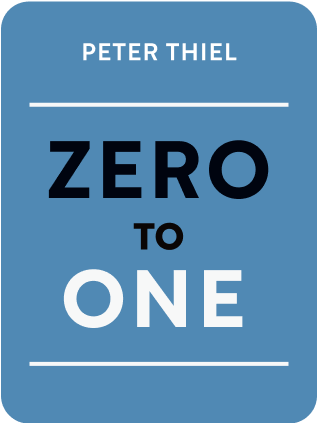

This article is an excerpt from the Shortform summary of "Zero To One" by Peter Thiel. Shortform has the world's best summaries of books you should be reading.
Like this article? Sign up for a free trial here .
What is a monopoly? Can a monopoly help a business succeed, and why should you consider becoming one?
When you consider the question, “What is a monopoly?”, you probably think of famous monopoly breakups. But in Zero to One, Peter Thiel argues that monopolies are helpful, since they allow a company to innovate. He makes a case for why we should rethink the questions, “What is a monopoly? And can they be positive for consumers?”
What Is a Monopoly?
What is a monopoly in economics? Monopoly is the opposite of perfect competition. While competing companies must sell their product at the market price, a monopoly owns the market and sets the price.
However, monopolies aren’t all the same. What is a monopoly in economics versus what is a monopoly market? Market domination can be achieved in different ways, some more defensible than others—for instance, bullying, acting illegally, by government sanction, or by innovating. In this book, monopoly refers to a company that’s so good at doing something that no other company can duplicate it. For example, no other company has competed with Google in search since the 2000s, when it outdistanced Microsoft and Yahoo!
Americans equate competition with capitalism, which is seen as the opposite of socialism. But competition and capitalism are really opposites—capitalism is the accumulation of profits, but in perfect competition, profits disappear.
To succeed as an entrepreneur, you need to create something new with long-term value, rather than competing with everyone else to sell the same thing.
Characteristics
So what is a monopoly, exactly? Monopoly businesses with strong future cash flows share several characteristics: proprietary technology, network effects, economies of scale, and branding. Comparing your business against these characteristics may point up opportunities for improving its long-term viability. A monopoly in economics will have those characteristics. Explore them further:
1) Proprietary Technology
This may be your greatest possible asset because it makes your product difficult to copy. For example, proprietary technologies used in Google’s search algorithms for aspects such as query autocompletion make the search engine hard to replicate. This helps you define what is a monopoly market in your industry.
For proprietary technology to give you a monopolistic edge, it needs to be at least 10 times better in some major way than anything like it. Anything short of a dramatic difference will seem insignificant to users, which means they’ll be unlikely to switch from what they’re used to.
You can differentiate a product as 10 times better in several ways:
- Create something new—when you create an option that never existed before, for instance a cure for baldness, the increase in value over the alternative (nothing) is exponential.
- Improve on something so dramatically that you eliminate competition. For example, PayPal improved buying and selling on eBay exponentially by enabling buyers to pay immediately. Amazon outdistanced all other bookstores when it started in 1995 by offering an unlimited number of book titles. Amazon didn’t need to maintain an inventory of books—it just requested a title from a supplier when a customer ordered it.
- Dramatically improved design can also elevate a product far above others in its category. For example, while there were several rudimentary tablet computers available, Apple’s iPad was superior because it was so much easier to use.
2) Network Effects
A network effect is the way additional users improve the value of a product or service for all users. For example, the more your friends use Instagram, the more value you get from being on it too, rather than on a different social media app your friends don’t use. To generate network effects, your product has to be immediately valuable to its earliest adopters and then grow from there. A network business has to work on a small scale before it can go big—in fact, you have to plan on starting small. Mark Zuckerburg started Facebook by getting just his Harvard classmates to sign up.
3) Economies of Scale
A monopoly gets stronger as it grows because the fixed costs of creating a new product (like office space and engineering or development) are spread over a greater volume of sales and the cost per unit declines.
For software startups, economies of scale are huge because it costs little to produce a copy of the software to sell. However, for businesses that provide a service, the advantages of scale are limited. For instance, even by hiring more people and opening new locations, a yoga studio can only serve a certain number of customers. By contrast, a small group of software developers can provide value to millions.
When starting a business, you should build in the capability of scaling. For example, Twitter has built-in scale: it can keep increasing the number of users without adding customized features.
4) Branding
Creating an unassailable brand is integral to having a monopoly. For example, Apple is the most powerful brand in technology. Everything from product design (including look and materials), to store design, price, and advertising contribute to an overall impression that Apple products are like no other. What is a monopoly market is not just based on product; Apple products built their status as a monopoly based on branding.
Of course, branding alone isn’t enough. Apple’s market dominance is based on superior products backed by an array of proprietary hardware and software technologies. Apple also benefits from strong network effects created by both users and developers of software for its devices.
Not only do you now know the answer to “what is a monopoly in economics?”, you know why monopolies can change the way we do business.

———End of Preview———
Like what you just read? Read the rest of the world's best summary of Peter Thiel's "Zero To One" at Shortform .
Here's what you'll find in our full Zero To One summary :
- Why some companies genuinely move the world forward when most don't
- How to build a company that becomes a monopoly (and why monopolies aren't bad)
- Silicon Valley secrets to selling products and building rockstar teams






